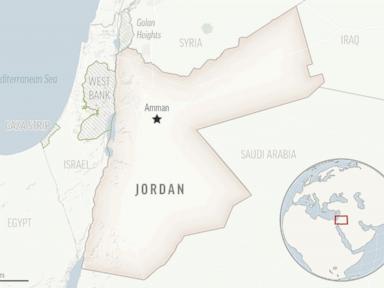ARTICLE AD BOX
ISRAELI warplanes blasted Hezbollah targets in seven areas of Lebanon as the “new phase” of its war ramps up.
The bombing follows two surprise sabotage attacks with pagers and walkie-talkies targeting the terror group by Mossad spies.
 AFP
AFP Reuters
Reuters Eyevine
Eyevine X
X
The surprise strikes have killed at least 37 and injured thousands more as Lebanese hospitals are treating patients missing fingers and limbs.
Israel has now seized the initiative and moved thousands of troops to the north of the country as analysts believe it could be set to invade.
Warplanes fired on settlements in southern Lebanon overnight and heavy artillery also fired across the northern border.
The strikes came as Hezbollah continue to fire rockets into northern Israel with five injured as the terror group retaliates against the surprise blitz.
Cross border exchanges increased as Israeli sources said toll from the two-day blitz of Hezbollah communications was higher than the terror group had admitted.
reports said Hezbollah’s elite group of fighters called “The Radwan Unit” had been hit hard by the pager strike.
Doctors in Lebanese hospitals overwhelmed by a flood of admissions following two waves of blast said many casualties had been blinded.
Others had fingers or entire hands blown off while those who had not taken pagers and walkie talkies from pockets suffered appalling leg and groin injuries.
Dr Elias Warrak described Wednesday as “the worst day of [his] life as a physician”.
He revealed at least 60 per cent of the people he had seen had lost at least one eye and some had suffered brain damage.
He added: “I believe the number of casualties and the type of damage that has been done is humongous.
“Unfortunately, we were not able to save a lot of eyes, and unfortunately the damage is not limited to the eyes – some of them have damage in the brain in addition to any facial damage.”
The Israeli military said on Thursday it struck six Hezbollah “terrorist infrastructure sites” and a weapons storage facility in southern Lebanon overnight, as fears grew of a full-blown war.
The air force “struck Hezbollah terrorist infrastructure sites in the areas of Chihine, Tayibe, Blida, Meiss El Jabal, Aitaroun and Kfarkela in southern Lebanon, as well as a Hezbollah weapons storage facility in the area of Khiam in southern Lebanon,” a military statement said.
In a separate statement, the military said two drones crossed into Israeli territory from Lebanon on Thursday.

 TELEGRAM/UNPIXS
TELEGRAM/UNPIXSThey fell in areas near Beit Hillel and Yaara, causing no injuries but one sparked a blaze that Israeli firefighters were extinguishing, the statement added.
Israel and Hezbollah have been exchanging fire across the Israeli-Lebanon border in parallel with the war Israel has waged in Gaza against Hamas after October 7.
Tens of thousands of people have had to flee the border area on both sides.
Hezbollah have killed 26 civilians and 20 soldiers and forced 80,000 Israelis to flee south to escape the blitz, which has damaged nearly 1,000 homes within six miles of the border.
Netanyahu vowed on Wednesday to return the evacuated Israelis “securely to their homes”.
Israeli Defence Minister Yoav Gallant declared the start of a “new phase” of war as the country’s army moved north.
 AFP
AFP A car on fire in Beirut after a blast Wednesday
A car on fire in Beirut after a blast WednesdayThe announcement paves the way for the first full-scale invasion of southern Lebanon since 2006 in a drive to push back the terror group and allow Israelis to return home.
But the risky move raises the spectre of Hezbollah backers, Iran being drawn into a devastating regional conflict.
IDF air power alone has been unable to stop the life-threatening barrages and analysts now believe a ground invasion of southern Lebanon could be imminent.
One plan being considered by Israeli war chiefs is a move to occupy a buffer zone inside southern Lebanon.
The Trojan horse communication device strikes managed to get explosives near some of the most trusted Hezbollah associates.
The Iranian ambassador to Lebanon lost an eye after he was struck by one explosion.
The Japanese manufacturer of the walkie-talkies used in Wednesday’s blasts said it was impossible they were used as they ceased making them a decade ago.
ICOM director Yoshiki Enomoto said: “There’s no way a bomb could have been integrated into one of our devices during manufacturing.
“The process is highly automated and fast-paced, so there’s no time for such things.
“If it’s genuine, we’ll have to trace its distribution to figure out how it ended up there.”
Israel has also revealed today to have foiled an Iranian plot to assassinate Prime Minister Benjamin Netanyahu and the Defence Minister Gallant.
Israeli spies’ targeted proxy Hezbollah which was also hammered in a second sabotage strike Wednesday that hit walkie-talkies.
Iran has hit back at the country and accused Israel of “mass murder”, describing Tuesday’s surprise pager attack as “terrorism”.
The Islamic Republic has threatened Israel saying it “reserves its rights under international law to take required measures deemed necessary to respond.”
Hezbollah has also sent its own chilling threat, telling Israel to expect “fair punishment”.
Where did the pagers come from?

By James Halpin, Foreign News Reporter
Iranian proxy Hezbollah ordered the pagers months ago but never thought the quaint piece of tech could be tampered with.
Hezbollah shifted to pagers after the group’s leader told members to stop using phones in February over fears they could be tracked by Israeli spies.
A senior Lebanese security source said the group had ordered 5,000 beepers made by Taiwan-based Gold Apollo, which were brought into the country in the spring.
But Gold Apollo told media in Taipei today the specific order was manufactured by BAC Consulting KFT in Budapest.
Gold Apollo boss Hsu Ching-kuang said BAC asked to manufacture their own pagers with the company’s trademark and they were paid from a mystery Middle Eastern bank account, NPR reports.
BAC Consulting chief executive Cristiana Bársony-Arcidiacono confirmed to media that her company worked with Gold Apollo.
But said, “I don’t make the pagers. I am just the intermediate.”
At some point during the manufacture, the devices were modified by Israel’s spy service with a small amount of explosive.
The AR-924 pager is described as being “rugged” and contains a rechargeable lithium battery with 85 days of battery life.
Their longevity would be important in Lebanon which has suffered major power outages.
Pagers also run on a different wireless network than mobile phones, making them more resilient in emergencies and harder for Israel to hack digitally.
The affected pagers were only delivered to Hezbollah recently, but other associates of the group were also injured, including the Iranian ambassador to Lebanon.
 X/Rulaelhalabi
X/Rulaelhalabi The Iran-funded terror group Hezbollah controls much of Lebanon
The Iran-funded terror group Hezbollah controls much of Lebanon.png)
 2 months ago
3
2 months ago
3








 English (US)
English (US)